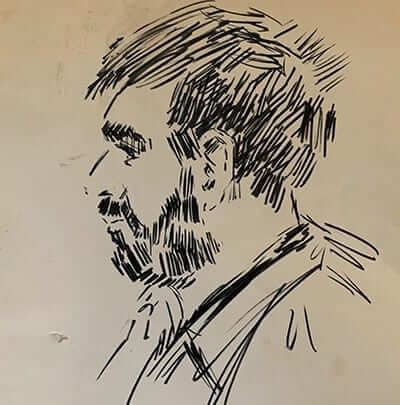In White Sands, New Mexico, stands a monument—a black obelisk—as historic as the sights in Monument Valley. The monument stands at Trinity, birthplace of the nuclear age. The monument stands like a desert plant, a simple but potent icon of the West. In the desert also lies the truth about the illusion of time, with allusions aplenty to a specific time of day. In “High Noon” lies a question for the ages: Whatever happened to Gary Cooper?
A gangster’s monologue about a monosyllabic cowboy, the question is a Soprano’s lamentation for the strong, silent type. The gangster is Tony Soprano as TV’s Cain, an antihero in search of a myth; for Marshal Will Kane is beyond Soprano’s grasp.
Kane is the moral opposite of a fictional killer, never mind the naturally conceived son—the firstborn child—of a couple created by God and corrupted by sin. Kane does not answer a question from God with a question of his own. Nor does he poison the earth with the blood of innocents, condemning himself to a lifetime of itinerancy and shame. He does his job, in spite of everything people believe about themselves because he learns that people are not really good at heart.
Not for nothing does the release of “High Noon” coincide with the publication of the English language translation of Anne Frank: The Diary of a Young Girl. More ironic is that “High Noon” is a better (albeit unintentional) adaptation of the diary’s theme than all Hollywood and Broadway adaptations of the diary. Most ironic of all is the tragedy of how a Jewish girl’s contemporaneous account of the persecution of her coreligionists lost its identity at the hands of Lillian Hellman, a Stalinist and an apostate Jew.
The loss is universal in its particularity, because the story of a fictional lawman is not unlike the stories people tell themselves in order to live; in order to live with themselves, because most people are worse than bad—they are indifferent. Such is the evil of banality. Such is the life of the functionary, the bureaucrat, the desk murderer.
Such is the indifference of the majority, whose silence is appalling. Were this not the case liberty would outrank security and conscience would outweigh compliance.
We would also be safe, not because of order through fear, but because of freedom from fear. We would have fair and speedy trials, not show trials. We would earn the protection and service of law enforcement.
We would earn the respect of Kane, rather than bearing the mark of Cain. We would rebuke the criminals in our midst, not the police officers patrolling our streets. We would act like men, able to acknowledge our fears without succumbing to them.
Before we look for a hero to save us, we have to be worth saving. Do not, in other words, wait for the cavalry to come while ignoring the lessons of Calvary, that evil does not happen by accident or chance; that complicity is common; that righteousness is rare.
If our nation is to survive, the better angels of our nature must defeat the base instincts of human nature.

